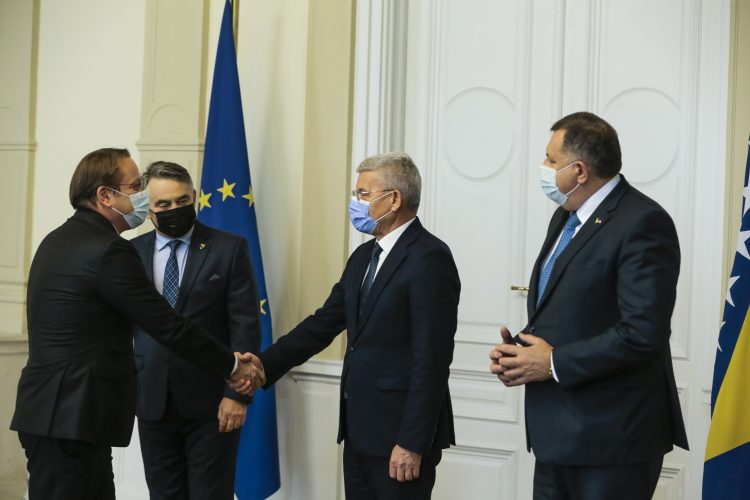
Bosnian media published content of a report that European Union ambassador in Bosnia and Herzegovina Johann Sattler allegedly wrote for the official Brussels, following the visit by European Enlargement and Neighbourhood Commissioner to BiH in late November, where he met with political leaders and authorities. In addition to the details of an agreement that defined a way out of the current crisis, the report labelled former international peace envoy, Austrian diplomat Valentin Inzko as the main culprit for current situation.
“The EU HoMs met on BiH Statehood Day for a de-brief by Commissioner Varhelyi, whose programme to BiH ran from 24-25 November and encompassed visits to Sarajevo, Banja Luka and Mostar for meetings with political leaders to discuss ways to urgently overcome the political crisis. A fragile political package agreement seemed to have been reached, which would not only halt the implementation of policies for the unilateral withdrawal of the RS from State Institutions, but also de-block BiH state-decision-making bodies in order to continue work on EU reforms,” said the report that N1 had insight into.
Commissioner Varhelyi shared his impressions from the encounters with Bosnian political interlocutors, to whom he conveyed the importance of immediately resolving the ongoing political crisis with the aim to work on passing decision for the implementation of investment projects under the Economic and Investment Plan (EIP) for the Western Balkans.
“A failure to do so within the set deadlines would otherwise result in BiH missing out – as the only country in the Western Balkans Region while it could instead become the biggest beneficiary – ona unique opportunity to benefit from 1.5 billion EUR of investment funds. Therefore, decision-making bodies needed to be unblocked as soon as possible, focusing on important EU reforms, which were conditioned for the allocation of funds from the EIP and the Western Balkans Green Agenda. Concerning the required reforms, the Commissioner had explained that cherry-picking was not an option and neither the return to limited to no-progress on their implementation, as had been the case before the political crisis had set in. The EC Opinion's 14 Key Priorities needed to be seriously addressed, and there was a unique opportunity to do so in the immediate term,” reads the document whose copy was initially published by the investigative web portal Istraga.ba.
As a result from his meetings, the Commissioner stated that political interlocutors understood what was at stake and had all expressed willingness to come to a solution.
“As such, the Serb member of the BiH Presidency and SNSD leader (Milorad) Dodik had signalled willingness on two issues. Firstly, on the postponement of the vote on RS’ unilateral withdrawal from State Institutions by a period of 6-months. Secondly, on the return of RS representatives to BiH State decision-making bodies to work on the implementation of the Economic and Investment Plan, including the necessary reforms for that purpose,” emphasises the report.
Later on, the document reads that the Commissioner clarified, in terms of the special session of the RS National Assembly, planned for December 10, that the session “would indeed take place but that the moratorium to pass legislation on the unilateral withdrawal from State Institutions would be announced for a 6-month period.”
“This has been agreed, and RS representatives would be held accountable for any contrary decisions,” the document said.
The entity parliament's special session took place on December 10, when MPs voted on withdrawal from certain state institutions, including the Armed Forces, the High Judicial and Prosecutorial Council and the Indirect Taxation Authority, and defined further steps in the process.
In terms of overcoming the difficult political situation, the Commissioner saw that a fragile political package agreement could be reached focusing on three topics.
“These included: 1) solving State Property issues based on common criteria and in close co-operation with the US and the Office of the High Representative; 2) addressing the issue of former High Representative (Valentin) Inzko's Criminal Code amendments through a law adopted by the BiH Parliamentary Assembly; 3) and Constitutional and Electoral Law Reform”, according to the document, which points out that Dodik had indicated he would accept a solution on the third point that political actors in the Bosniak-Croat shared Federation were able to agree on.
The report also said that member of the Collegium of BiH House of Peoples and SDA leader Bakir Izetbegovic “softened” his stance about the adoption of a law by the BiH Parliament addressing the issue of Inzko's amendments, and that the Commissioner also asked RS opposition parties to engage constructively towards achieving a solution to the current blockade.
The Commissioner also explained his rationale for visiting Banja Luka and Mostar separately, which was a way of showing respect and a delivery on promises made before.
“While underlining the fragile nature of the political package agreement that was put in place the Commissioner also pointed out that deadlines had been proposed for its implementation, which would allow most issues to be addressed by the end-of-year, The political actors would be held accountable for the promises made. One of the more difficult matters was the issue od the HR and unwillingness of RS representatives to recognise HR Schmidt as legitimate,” the document points out and adds that the Commissioner asked for technical solutions which would allow the gradual recognition of Schmidt by RS representatives by working on State property issues with OHR experts.
One of the conclusions said it was agreed that no communications would be made by BiH political actors on the plan of action, but that instead the Commissioner would give a statement at the end of his visit passing on a clear and simple messages on the way forward.
Non-recognition of the HR Schmidt by RS representatives was assessed as “a huge bottleneck” and the Commissioner indicated that careful work needed to be conducted in this regard, finding a working solution with the EU involving OHR experts to facilitate a political solution on State property before the law would be put forward for adoption.
“Underlining the importance of the mandate of the OHR and that it was not HR Schmidt's fault that the current situation was as such, the Commissioner shared his frank assessment that his predecessor, HR Inzko was to blame for the current political crisis in BiH as well as the de-legitimisation of the OHR,” said the report, according to which unblocking of the BiH Parliament depended on resolving the HR Inzko's amendment issue.

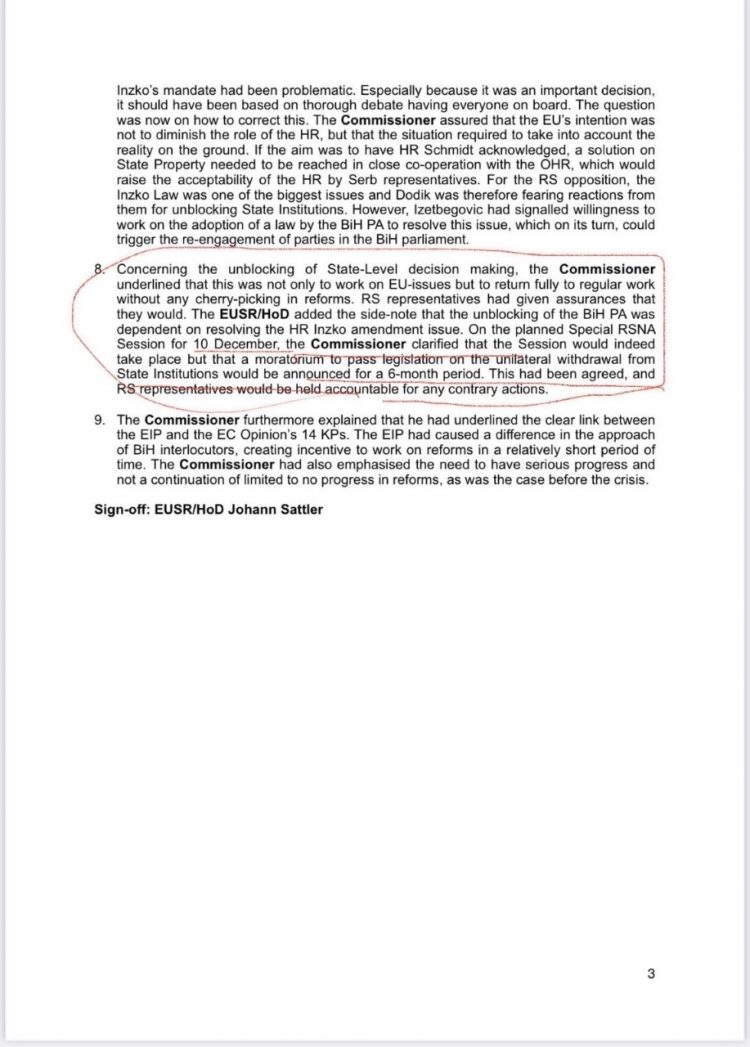
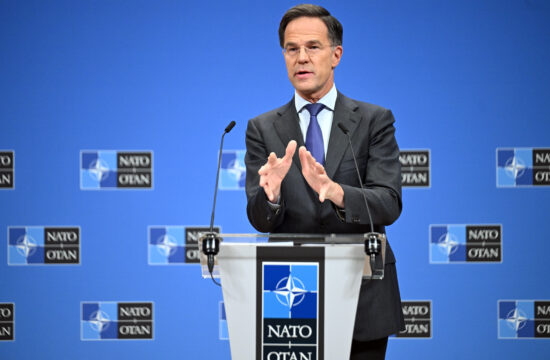
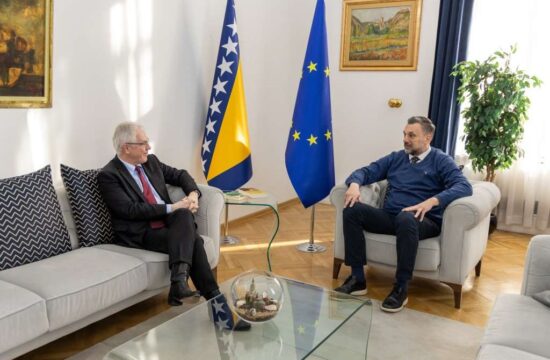
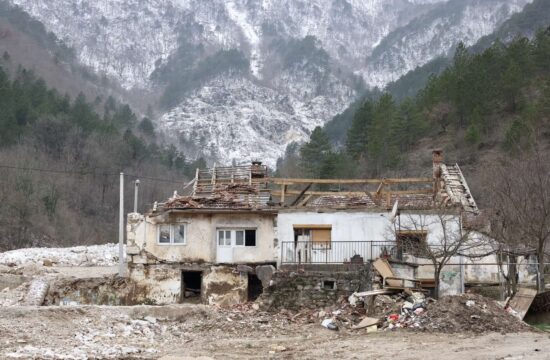
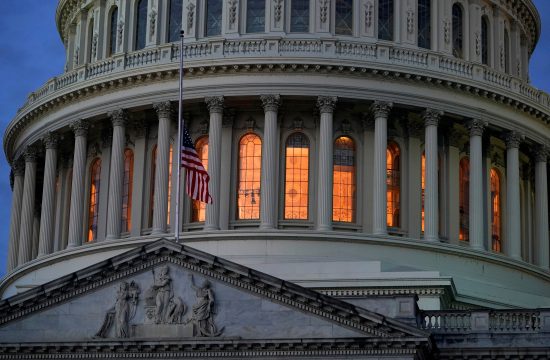
Kakvo je tvoje mišljenje o ovome?
Budi prvi koji će ostaviti komentar!